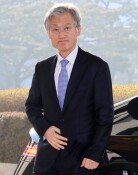Hyundai Chairmans Executive Management Policy: No Influence, No Mistakes
Hyundai Chairmans Executive Management Policy: No Influence, No Mistakes
Posted September. 23, 2005 07:33,
The Hyundai-Kia Automotive Group makes regular executive changes in the beginning or at the end of each year. For vice presidents and higher-level executives, however, these regular personnel shifts do not have any significant meaning.
This year alone, the companys chairman, Chung Mong-koo, made 10 times of promotional or transfer decisions on each affiliates senior executives higher than vice president, including the latest personnel moves. Such frequent executive changes are rare among other large conglomerates.
Not only the timing, but also the details of the executive shifts are quite a surprise.
For Yoon Yeo-chul, the former manager of the Hyundai Motors plant at Ulsan, who was promoted to president in the latest shift, it took 24 years to obtain a seat on the board of directors in 2003 after joining the company in 1979. In less than a year, however, he was appointed as managing director, and after three months, he became the executive director. His fast promotion continued, as he was appointed as vice president in eight months and as president in another eight months.
In some cases, rejected figures are asked to rejoin the company. Senior Vice President Lee Jae-wan, the chief of the companys marketing headquarters and strategic coordination division, was offered a key position when he rejoined the company six months after his retirement.
Chairman Chungs unique personnel management has both strengths and weaknesses.
Chairman Chungs continuous personnel changes are very useful in that the company can relocate necessary talent whenever and wherever necessary, said one senior executive of Hyundai-Kia Automotive Group. This is an appropriate method for a growing business such as Hyundai-Kia Automotive Group. Putting constant tension on the organizations and letting them always do their best is considered as another advantage.
Nonetheless, continuous personnel shifts are also interpreted as a reflection of Chairman Chungs style, which never tolerates on-the-spot mistakes by executives. Some even worry that such frequent shifts might undermine the companys business continuity, making it difficult for professional managers to forecast even the near-term future.
Be Careful When You Begin to Be Considered Influential-
One remarkable feature of the recent personnel shifts by Hyundai-Kia Automotive Group is that signs of a generation shift are obvious.
In the latest shift, Hyundai Mobis Chairman Park Jung-in, who had been profoundly trusted by Chairman Chung since the days of Hyundai Precision Industry, the predecessor of Hyundai Mobis, stepped down and was appointed as an advisor. Earlier this year, President Yoon Guk-jin of Kia Motors left the company, and last year, Hyundai INI Steel Chairman Yoo In-gyun stepped down and became an advisor for the company. In this manner, a spate of professional managers ages 60 and above left their posts.
Another characteristic is that the chairman does not let someone that might be considered influential be close to himself for a long time. This is why it is the norm in Hyundai-Kia Automotive Group that you should be extremely careful when people begin to call you a person of influence.
Vice Chairman Lee Sang-ki of Hyundai Mobis, who left the company last month, had been the chief officer of the core part of the company, the planning and coordination division, until April. President Chung Soon-gwon, who had been in charge of planning and coordination prior to Vice Chairman Lee, was transferred to the vice-chairman post of Rotem. His transfer was considered a promotion in terms of rank, but a downgrade in terms of actual influence.
A variety of interpretations were also suggested when President Choi Han-young was transferred to the presidential post of the commercial vehicle division, which is deemed to be of less importance compared to his previous position.
In the Hyundai-Kia Automotive Group, it is quite rare that close aides to Chairman Chung maintain their influence for a long period. This is a stark contrast to other conglomerates where key aides have enormous power and never lose their influence easily. Sources inside and outside the group suggest that with the departure of Chairman Park Jung-in, vice chairmen Seol Young-heung and Kim Dong-jin are the only professional managers who are close enough to Chairman Chung to read his inner thoughts.
Sung-Won Joo Hyo-Lim Son swon@donga.com aryssong@donga.com





![[천광암 칼럼]장동혁은 대체 왜 이럴까](https://dimg.donga.com/c/138/175/90/1/wps/NEWS/IMAGE/2026/02/22/133399127.1.jpg)

